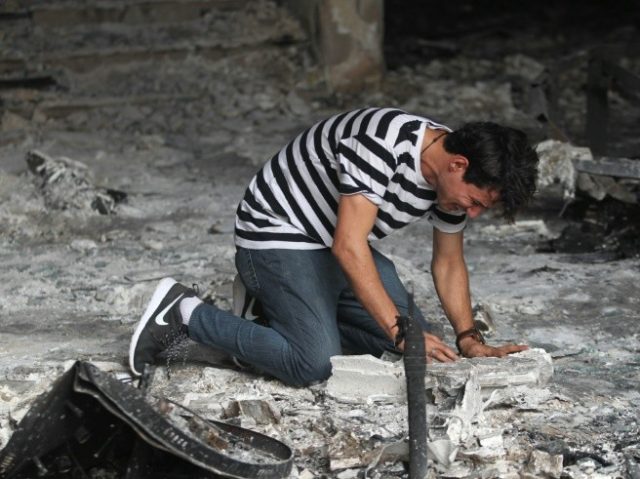The world nods in brief acknowledgment and goes on. After all, most people have become accustomed to hearing about terrorist attacks in Iraq that have been ongoing for over ten years now. Iraqis die barely making headlines.
Two days before the Eid Al Fitr celebration, as Iraqis crowded the Karadah shopping district preparing for the upcoming holiday, tragedy struck in the midst of the shops and cafes where it can been seen and felt the most.
How can this still be happening? How does a truck filled with explosives drive right up to the heart of a busy neighborhood and go off unseen? The 200-plus people who lost their lives will never know – and the injured physically and otherwise won’t either. That doesn’t stop us from conjuring up explanations and trying to come up with answers. It is said that things happen for a reason – but what reason can possibly be behind this? What can justify blowing up children shopping for their new Eid clothes?
I try and get answers myself. I call my aunt in Baghdad trying to understand how this could have happened. She doesn’t have answers either, and tells me the number of dead is higher than what’s being reported. It’s a lot, she tells me, sounding grim, sad, and lost in her thoughts. She’s a mother of three and a grandmother of eight – all accounted for today, but she knows as I do that it could have been her children, my cousins, or their children and it still could be them, given Iraq’s bleak and uncertain future.
I persist in trying to get answers and ask how the government let this happen, what could they possibly be saying on national TV, knowing that she is an avid news watcher? She tells me they’ve apologized and they have no idea either. They can’t control anything.
PM Haider al-Abadi, who was counting on the victory in Fallujah to bolster his power and reputation among Iraqis, tried to go and visit the scene – only to have people throw shoes and stones at his convoy. And why shouldn’t they? His government and the one before it can’t keep them safe. This particular street where the explosions went off was closed earlier in the day and suddenly opened back up at midnight. That it was that easy for ISIS to get to the heart of the capital, where both Shiites and Sunnis shop and eat, is unforgivable. Blame was directed at the bomb detectors the police have been using at checkpoints – they might have been defunct and not working – purchased that way as part of the prevalent widespread corruption the country has lived with for years.
The World has left Iraq to fight ISIS alone. With the US’s intermittent interventions from the air and the paltry number of advisers on the ground, this insufficient and inconsistent assistance hasn’t dented ISIS’s gruesome and vile operations in Iraq or elsewhere. ISIS militants this past week alone have killed scores of people from Istanbul, to Bangladesh, and back to Baghdad. But Iraq has been bearing the brunt for a long time, there have been terrorist attacks all year long garnering barely a mention or a headline, but lives lost just the same and people left dealing with this new normal.
The funerals have started and the official mourning period has commenced. Whole families were wiped out and people are still missing. Unfortunately, this wont be the last time. We are outraged every time it happens like it’s the first time, but as ISIS gets squeezed on the battlefield, they’ll resort to more of these disgusting guerrilla tactics to exact revenge, chaos and death.
ISIS has become a global problem that is everyone’s business. This past week alone, ISIS made it clear that people out at a café, going to an airport, watching a soccer game or shopping, will be killed in their neighborhoods – anytime, anywhere. Enough with the inconsistencies and the intermittent efforts. Iraq needs help getting rid of ISIS for the world.
Nadia Al Sultani, an international development professional having worked in Iraq, Afghanistan, Syria, and now Pakistan. She is the author of Baghdad Stories: An Iraqi-American Memoir. Al Sultani, an Iraqi-American, holds an MA in International Economics and spent several years working in international banking on Wall Street before beginning her career in public service.

COMMENTS
Please let us know if you're having issues with commenting.